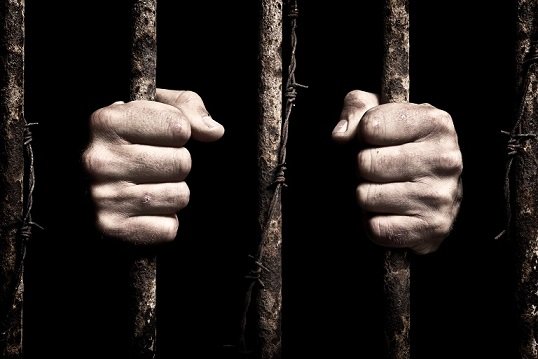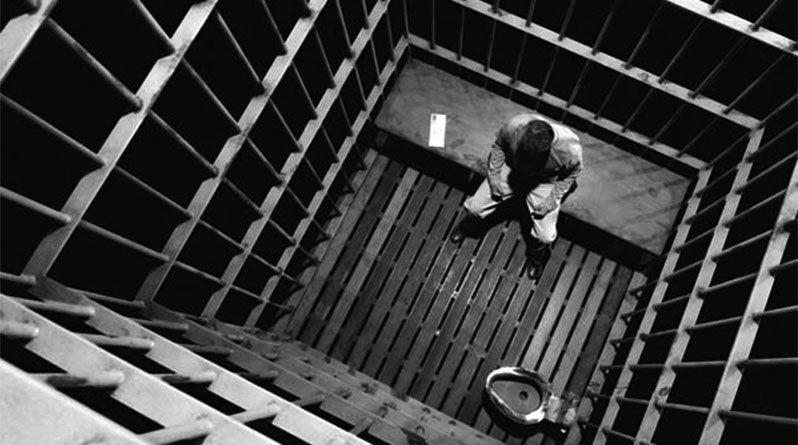How Effective is Our Prison System?
America only has 4% of the total global population but over 25% of the world's prisoner population. This means, if my maths is correct, that if the U.S. had 20% of the world's population, then it'll have over 120% of the world's entire prison population, including its own.

I hope they give out tetanus shots
Currently, almost 1% of the nation's population is incarcerated. To put that into perspective: if you walk into a room of a hundred people, it'd be very likely that one of them is in prison, statistically speaking, especially if that room is located in a prison. Of these prisoners, 93% are male, which therefore implies that only 7% of prisons have shower floors that are not littered with used soap due to people being too afraid to pick them up.
With such high imprisonment rates, one would be inclined to ask what is the purpose of putting someone behind bars and how beneficial is it to society as a whole?
Justifications for Incarceration
There are three common reasons why criminals are sent to prison for which I could come up with a joke, and one other one:

We just have to climb over the barbed wire fence and then another barbed wire fence and then one more barbed wire fence and voila, we've broken into prison...shit! Wrong way!
- Rehabilitation - Perhaps the loftiest of these goals is the hope that sending someone to prison will reform them as a person. This murderer + time in prison = noble laureate idea has proven to be a little too optimistic in practice.
- Incapacitation - Imprisoning those who have a track record of endangering others prevents them from harming anyone further. Other than inmates, of course, but we don't give a shit about them. And maybe the guards, but they knew what they were signing up for. And the rest of the population, when they're released. But other than that no one can possibly be harmed.
- Retribution - Ah, good old fashioned punishment for the sake of punishment. The mere knowledge that someone who's wronged us or someone we love or someone we don't love, is rotting away in a cell somewhere, just fills our hearts with joy and warmth.
- Deterrence - The threat of imprisonment for certain criminal acts should, in theory, deter people from committing those acts. In practice, with the highest prison population in the world, it's hard to argue that incarceration is an effective deterrent. Feel free to come up with your own punchline here if you want.
Cost and Effectiveness
Maintaining the number one spot for putting people behind bars certainly doesn't come cheap and the U.S. spends over $100,000 per inmate, per year to outdo the competition. This comes to a cool $75 billion dollars annually. For the price of attending Harvard per inmate, you'd expect luxury accommodation and 5 star services right?
Well if you consider working a menial job for $1-$5 a day in an overcrowded facility 5 star luxury, then yes. You may also be upgraded to the presidential suite where you get your own private quarters with no access to sunlight for 23 hours a day, at the whim of the guards. Solitary confinement is widely regarded internationally as a form of torture but 80,000 american prisoners are kept in these cells at the sole discretion of their correctional officers. Many privately ran prisons have government contracts that guarantee occupancy levels of over 90%. It's like if your local doctor had a quota for pancreatic cancer diagnoses that they must meet just so surgeons can earn more money.

Some luxury cells come with extra high ceilings, probably to make it harder for you to hang yourself; the warden hates paperwork
After being forced to perform slave labor in a tumultuous and often tortuous environment, one would expect there to be measures in place for them to assimilate back into mainstream society when they're released right? Yeah you've probably caught on to my sarcastic leading questions by now, but in case you haven't, the answer is no. Quite the opposite: a criminal conviction on your record makes it almost impossible for you to procure employment. On top of social ostracization, ex-convicts are usually ineligible for welfare, food stamps, student loans or public housing, so it's small wonder over 70% of them turn to crime again. Well at least there are only a little over a million of them released a year, phew.
Conclusion
I am not denying the horrors of some crimes, but forcing over 2 million people into a perpetual cycle of being in and out of the prison system is not an effective solution.
There is a temptation to think that the best way to reduce crime is to punish the criminals harshly, but this is like saying the best way to clean your ass is to eat foods that cause constipation. In real life, the Batman approach to being tough on crime comes at a really high cost to society. Like a smoke alarm that goes off after the entire neighborhood has been reduced to ashes, lawmakers are finally starting to become aware of this, but there's a lot of work ahead of us yet.
Sources
Punishing Fails, Rehabilitation Works
Mass Incarceration in the US
Can Felons Get Welfare?
Shocking Facts About The US Prison System
That was a little dark, hopefully I get to write something a little more light-hearted next time. If you enjoyed this post please Upvote, Resteem and Follow me @trafalgar for more funny articles
